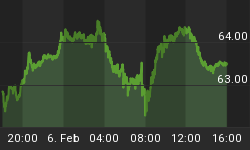"The high demand from banks to secure liquidity for the next three months, coupled with their desire not to lend out what liquidity they have, have made it virtually impossible to execute trades -- even at the official prices quoted for such borrowing.
That has created some extraordinary dislocations such as the fact that the cost of borrowing three-month money in the sterling Libor markets is now higher than borrowing six-month or 12-month money. "The system has just completely frozen up -- everyone is hoarding," says one bank treasurer. "The published Libor rates are a fiction."
Sense of Growing Crisis over Interbank Deals,
Gillian Tett, Financial Times, London
Tuesday, September 4, 2007
---
The smartest thing we can say about the markets right now is probably nothing. Confusion reigns.
The credit markets are seizing up, derivative contracts are defaulting, central banks are pumping out money but nobody is borrowing or lending. The term 'credit crunch' is mainstream but the word deflation has not permeated the airwaves just yet.
So what?
The stock market is aware of all of this but still no major break. Perhaps we are witnessing a slow motion crash. Or maybe the market is discounting some unbelievably positive event (an end to the war in Iraq?). Possibly a magical force is keeping the markets levitated. Who knows?
Currencies are also acting goofy. They're all over the place. One day the Yen strengthens and it looks like the Yen carry trade is being unwound. Next day the Aussie Dollar rallies as risk aversion becomes a forgotten byword.
Clearly there are 2 very large, very powerful, opposing forces colliding every day on the trading floor.
For a while we have been speaking about a stock market crash. We updated our views in 2007 crash market stock update II. Our hypothesis had been that Bonds would turn down to violate their June 2007 lows which would cause the stock market to finally capitulate. Alas, that still has not happened and whilst bonds are over-bought they remain well bid in this nervous market environment - possibly negating our crash scenario.
So what's it going to be?
We don't' know and neither does anyone else. If pushed we would say that more stock market weakness lies directly ahead:

Chart 1- Close correlation between the Gold: Industrial metals ratio and the Japanese Yen.
There is a close correlation between the Gold: Industrial metals ratio and the Japanese Yen. The fact that the ratio has broken to new highs (red arrow) indicates that the Yen may strengthen further causing the Yen carry trade to continue to unwind - placing stress on stock markets.
But as for a crash we now consider that a remote possibility. Instead we expect a long drawn out period of volatility with the market going essentially nowhere.
Investors should note they now have an opportunity to use the most powerful weapon their trading arsenal - sit on your hands and do nothing!
More commentary and stock picks follow for subscribers...















